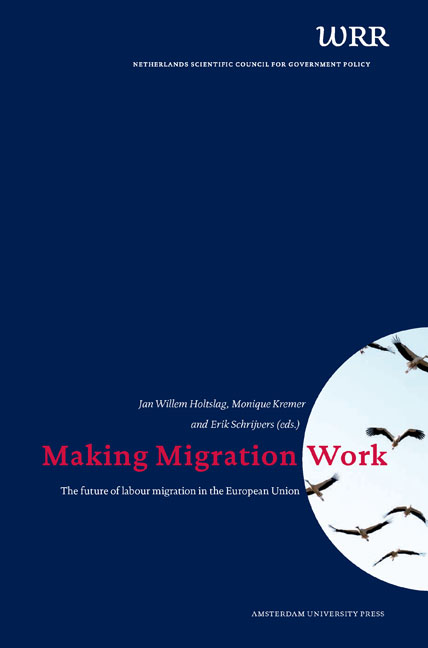Book contents
- Frontmatter
- Contents
- Introduction
- Acknowledgements
- 1 How to Make Migration Work
- 2 The Global and European Neighbourhood Migration Systems: Trends, Policy Choices, Governance Challenges and a Look Ahead
- 3 Satisfying Labour Needs in an Ageing Society
- 4 Migrant Workers: Inevitability or Policy Choice?
- 5 Intra-EU Labour Mobility after Eastern Enlargement and During the Crisis: Main Trends and Controversies
- 6 Labour Migration From Central and Eastern Europe and the Implications for Integration Policy
- About the Authors
3 - Satisfying Labour Needs in an Ageing Society
Published online by Cambridge University Press: 23 June 2021
- Frontmatter
- Contents
- Introduction
- Acknowledgements
- 1 How to Make Migration Work
- 2 The Global and European Neighbourhood Migration Systems: Trends, Policy Choices, Governance Challenges and a Look Ahead
- 3 Satisfying Labour Needs in an Ageing Society
- 4 Migrant Workers: Inevitability or Policy Choice?
- 5 Intra-EU Labour Mobility after Eastern Enlargement and During the Crisis: Main Trends and Controversies
- 6 Labour Migration From Central and Eastern Europe and the Implications for Integration Policy
- About the Authors
Summary
INTRODUCTION
The demographic change that is underway in almost all OECD countries – the retirement of the large baby boom cohorts and their replacement by smaller youth cohorts – has many policymakers concerned. Governments are accustomed to dealing with economic growth in the context of demographic expansion, but addressing demographic contraction seems like a different game. There are fears among national and international policymakers (European Commission 2009) that there will not be enough workers or enough of the right kinds of workers to replace those who will be retiring. Implicit in these fears is the belief that demand will persist and that even if many business owners retire, their businesses will not necessarily ‘retire’ with them. There will be a continued need for workers to satisfy the labour needs of enterprises in order for them to maintain their level of activity, let alone to expand. Also hovering in the background is the concern that the increase in social expenditures as a result of the pension and health care financing requirements for retired persons will put a strain on public budgets, which would be exacerbated by lessened contributions from a smaller workforce. There is an underlying assumption here as well, which is that the other sources of additional economic activity, namely increased productivity growth, additional hours of work and increases in participation rates will not be enough to offset the expected decline in the size of the working-age population or to provide or compensate for the types of skills that will be needed by enterprises. Recourse to increased labour migration thus seems inevitable.
For these reasons, the question of future labour and skill needs and how these are to be identified and satisfied is prominent on the radar screen of policymakers. But cannot the labour market be expected to adjust to satisfy the needs of employers? It can, and it will no doubt do so, but one means of adjustment is precisely the recruitment of labour from outside the country and this currently is not a freely available option to employers, they way, for example, other options are, such as wage adjustments, overtime, new technology, outsourcing or moving production abroad. There are externalities associated with opening up migration, among them the longer-term costs and benefits of migration to societies and the constraints imposed by public opinion, which employers may not take into account but which governments cannot ignore.
- Type
- Chapter
- Information
- Making Migration WorkThe Future of Labour Migration in the European Union, pp. 51 - 68Publisher: Amsterdam University PressPrint publication year: 2013



